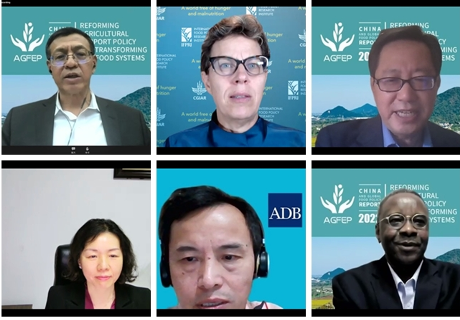Over the past several decades, the world has made substantial progress in improving global food security. Yet due to a combination of crises and other problems, the number of hungry people in the world has been rising since 2015; currently the figure is approximately 800 million. Meanwhile, China’s agrifood systems face a number of urgent challenges and must be transformed to focus on more nutritious and healthy foods, as well as green, low-carbon, efficient, resilient, and inclusive production and distribution.
The newly-published 2022 China and Global Food Policy Report examines how China can achieve that transformation, focusing on the evolution and reform of agricultural support policies and analyzing their impacts on nutrition and health, resources and environment, carbon emissions, common prosperity, and international trade. The report is a joint project of the Academy of Global Food Economics and Policy (AGFEP) of China Agricultural University, the China Academy of Rural Development (CARD) of Zhejiang University, the Center for International Food and Agricultural Economics (CIFAE) of Nanjing Agricultural University, the Institute of Agricultural Economics and Development (IAED) of the Chinese Academy of Agricultural Sciences (CAAS), and IFPRI.
An online launch event for the Chinese-language version of the report took place May 24; a June 9 English-language launch was moderated by IFPRI Senior Research Fellow Kevin Chen and IFPRI Director of Communications and Public Affairs Charlotte Hebebrand.
Here are some selected remarks from the two events:
May 24
Shenggen Fan, AGFEP Dean: “Global food security and nutrition face unprecedented challenges due to multiple risks and threats such as COVID-19, environmental degradation, trade frictions, and regional conflicts. In the new development stage, agrifood systems in China are facing similar challenges such as imbalanced diet, climate change, resource scarcity and the loss of biodiversity. In this context, how to reform China’s agricultural support policy becomes a vital issue to promote China’s national strategic goals.”
Xiaolong Feng, China Agricultural University, explained how agricultural support policies can be adjusted to achieve China’s 2060 carbon neutrality goal. Such changes, along with promoting the development of green and low-carbon technologies in agriculture, can reduce greenhouse gas (GHG) emissions from agrifood systems in the range of 29.1%-42.4% by 2060, while buttressing food security, which also has high economic returns. Investment in R&D and the adoption of green technologies, including slow and controlled-release fertilizers, deep fertilization machinery, and organic-inorganic compound fertilizers, should be further scaled up through favorable subsidy policies.
Huajun Tang, Chinese Academy of Engineering, former CAAS President: “The nutrition-oriented food systems include the production system, storage system, circulation system, processing system and food consumption system. We can understand the new trend of agricultural development from three aspects: First, promote a more balanced and adequate supply of agricultural products and higher quality agricultural products guaranteeing nutrition and safety; second, popularize nutrition education at the consumer end; third, deepen supply-side reform of agriculture and transform agricultural production towards a more nutritious way.”
June 9
Kevin Chen, IFPRI, outlined the impact of China’s subsidy policies and public investment, noting that subsidies for nutritious and low-carbon foods can improve dietary quality and reduce carbon emissions. In addition, investments in high-standard farmland construction, green agricultural research, and promotion of innovation have high returns, which in turn improves total agricultural production capacity, reduces inputs and carbon emissions, and has significant positive economic and environmental effects. Such policies promote the achievement of multiple goals including food security, improved economic efficiency, public health, and lower carbon emissions.
In addition, the report’s lessons can be applied outside of China, especially in developing counties looking to reform agricultural support policies, noted panelists from the UN Food and Agriculture Organization (FAO), Asian Development Bank (ADB), World Bank, International Fund for Agricultural Development (IFAD), and Food and Land Use Coalition (FOLU).
The full report is available on the AGFEP website in Chinese and English versions.
Qiyun Huang is a Communications Assistant with IFPRI’s East and Central Asia Office in Beijing.







